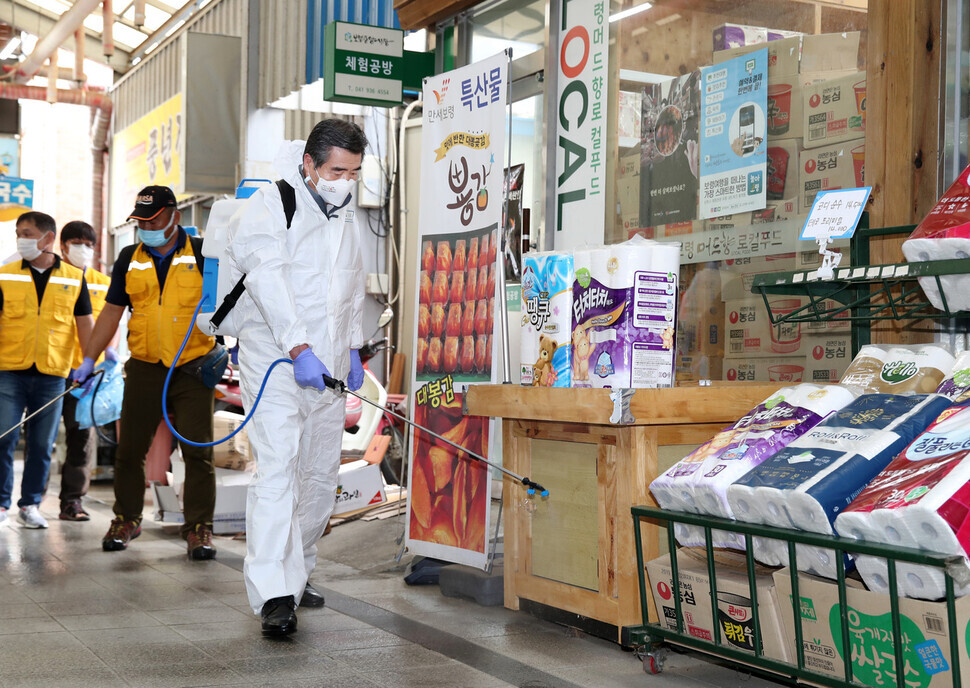hankyoreh
Links to other country sites 다른 나라 사이트 링크
S. Koreans still fumigate to disinfect despite ineffectiveness and potential dangers

On Sept. 16, Kim Dong-il, mayor of Boryeong, South Chungcheong Province, took the lead in the city’s efforts to stop the spread of COVID-19. As the mayor walked through a traditional marketplace, the thin metallic tube in his hand released a mist of disinfectant, diluted with water.
Since March, Boryeong has designated every Wednesday as a day for disinfecting 390 public facilities scattered across the city’s neighborhoods and townships, including traditional markets, social welfare centers, and elderly recreational centers. The typical method used is fumigation, with workers moving around the areas and spraying a diluted solution of disinfectant.
Boryeong is hardly an exception in this regard. Koreans have grown accustomed to seeing disease control workers spraying disinfectant in the air, over the water, and onto walls and floors.
But fumigation is a disinfection method that ought to be avoided. In its guidelines for disinfecting public facilities for COVID-19, Korea’s Central Disease Control Headquarters (CDCHQ) says that fumigation “creates aerosols that are a source of infection and increases the risk of their being inhaled.” Furthermore, the CDCHQ said, the approach leaves uncertainty about how much of the disinfectant is actually coming into contact with potentially infected surfaces.
“Misting or spraying disinfectant in areas isn’t effective at removing pollutants and carries the risk of irritating the eyes, skin, and respiratory system,” the CDCHQ said.
“Spraying large amounts of disinfectant on the streets, the side of the road, and in the natural environment can have a negative impact on the environment and the human body. According to the World Health Organization, there is little scientific evidence to show that outdoor disinfection helps prevent viral spread.”
Nevertheless, a considerable number of local governments in Korea are still fumigating. Along with South Chungcheong Province and Daejeon, numerous other metropolitan cities and provinces — including Seoul, Incheon, Gwangju, North Chungcheong Province, Busan, South Gyeongsang Province, and Gangwon Province — report a mixture of fumigation and surface disinfection.
Wiping down surfaces with disinfectant is more effective than fumigation, research findsBut the efficacy of these measures is uncertain. A team of researchers led by Jang Hui-chang and Gi Seung-jeong, professors at Chonnam National University, published a study comparing four hospitals with different therapeutic environments. The researchers detected the coronavirus on 17-48% of materials in rooms at three hospitals that sprayed them down twice a day, but didn’t find any coronavirus at a fourth hospital, which wiped down all surfaces with disinfectant tissues.
Park Eun-jung, a professor of toxicology at the East-West Medical Research Institute at Kyung Hee University, offered the following perspective. “Both quaternary ammonium compounds and chlorine-based materials can damage epithelial tissue and cause pulmonary fibrosis if they pass through the respiratory system and into the lungs. And since these materials don’t decompose in the natural environment, they accumulate in the water and soil, which is bound to have an impact on us, both directly and indirectly. Fumigation isn’t an appropriate method of disinfection. The government should also be thinking about ways to help overcome obstacles to proper disinfection.”
“We developed the guidelines in question to promote the safe usage of disinfectants based on domestic and international materials, and we recommend surface disinfection. We’ll keep publicizing this information to guide local governments to implement these guidelines on their own,” the CDCHQ said.
By Choi Ye-rin, staff reporter, and national press corps
Please direct comments or questions to [english@hani.co.kr]

Editorial・opinion
![[Column] When ‘fairness’ means hate and violence [Column] When ‘fairness’ means hate and violence](https://flexible.img.hani.co.kr/flexible/normal/500/300/imgdb/original/2024/0516/7417158465908824.jpg) [Column] When ‘fairness’ means hate and violence
[Column] When ‘fairness’ means hate and violence![[Editorial] Yoon must stop abusing authority to shield himself from investigation [Editorial] Yoon must stop abusing authority to shield himself from investigation](https://flexible.img.hani.co.kr/flexible/normal/500/300/imgdb/original/2024/0516/4417158464854198.jpg) [Editorial] Yoon must stop abusing authority to shield himself from investigation
[Editorial] Yoon must stop abusing authority to shield himself from investigation- [Column] US troop withdrawal from Korea could be the Acheson Line all over
- [Column] How to win back readers who’ve turned to YouTube for news
- [Column] Welcome to the president’s pity party
- [Editorial] Korea must respond firmly to Japan’s attempt to usurp Line
- [Editorial] Transfers of prosecutors investigating Korea’s first lady send chilling message
- [Column] Will Seoul’s ties with Moscow really recover on their own?
- [Column] Samsung’s ‘lost decade’ and Lee Jae-yong’s mismatched chopsticks
- [Correspondent’s column] The real reason the US is worried about Chinese ‘overcapacity’
Most viewed articles
- 1Could Korea’s Naver lose control of Line to Japan?
- 2[Column] Welcome to the president’s pity party
- 3[Column] US troop withdrawal from Korea could be the Acheson Line all over
- 4Naver’s union calls for action from government over possible Japanese buyout of Line
- 5[Editorial] Korea must respond firmly to Japan’s attempt to usurp Line
- 6Korea cedes No. 1 spot in overall shipbuilding competitiveness to China
- 7[Editorial] Yoon must stop abusing authority to shield himself from investigation
- 8[Column] When ‘fairness’ means hate and violence
- 9Korean opposition decries Line affair as price of Yoon’s ‘degrading’ diplomacy toward Japan
- 10Second suspect nabbed for gruesome murder of Korean in Thailand, 1 remains at large